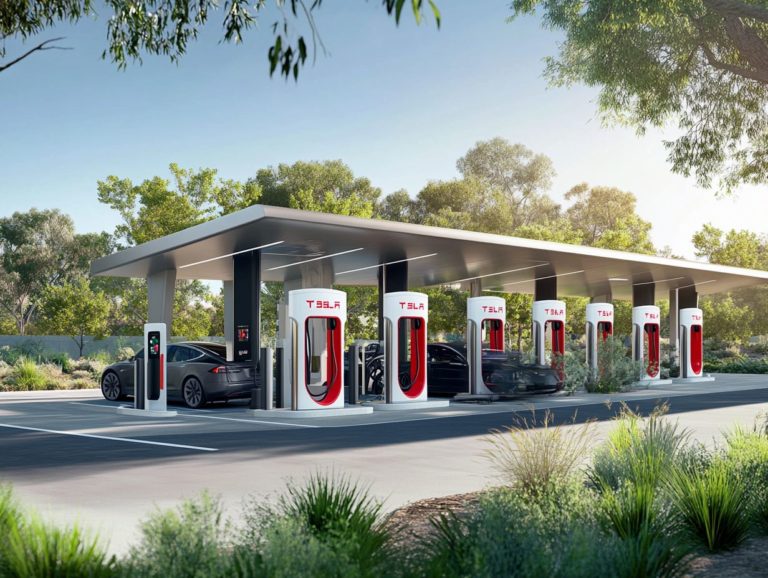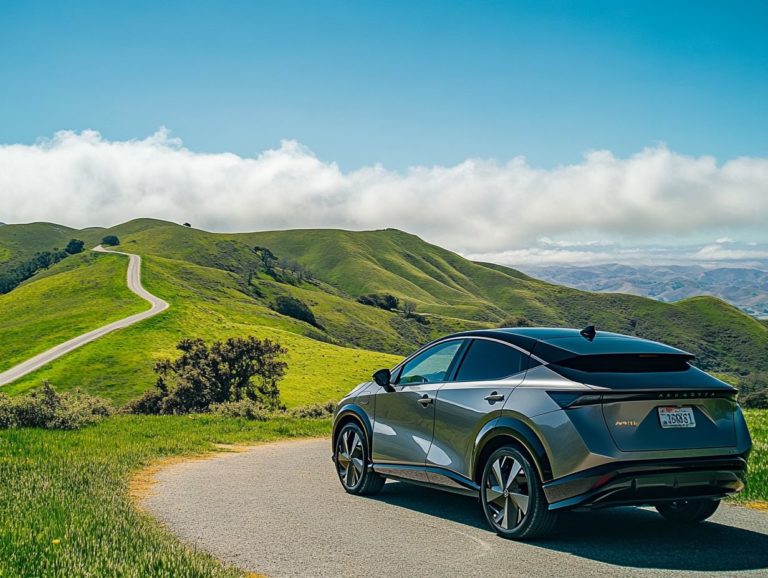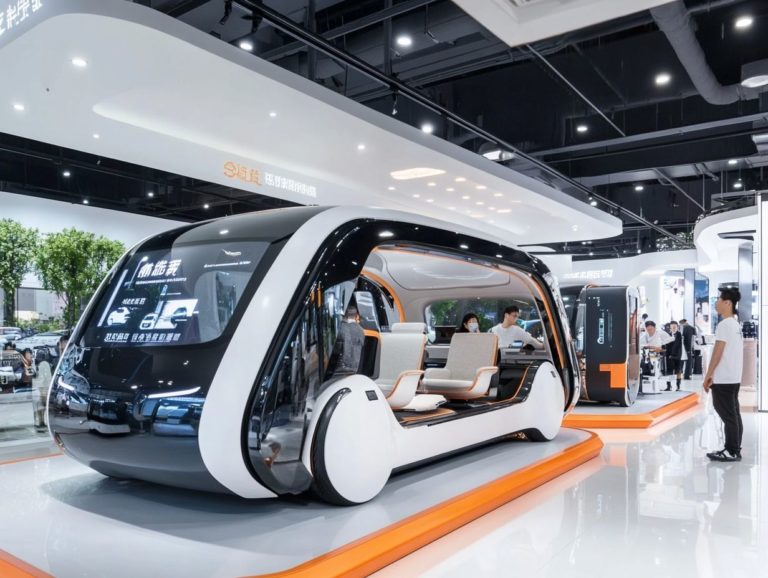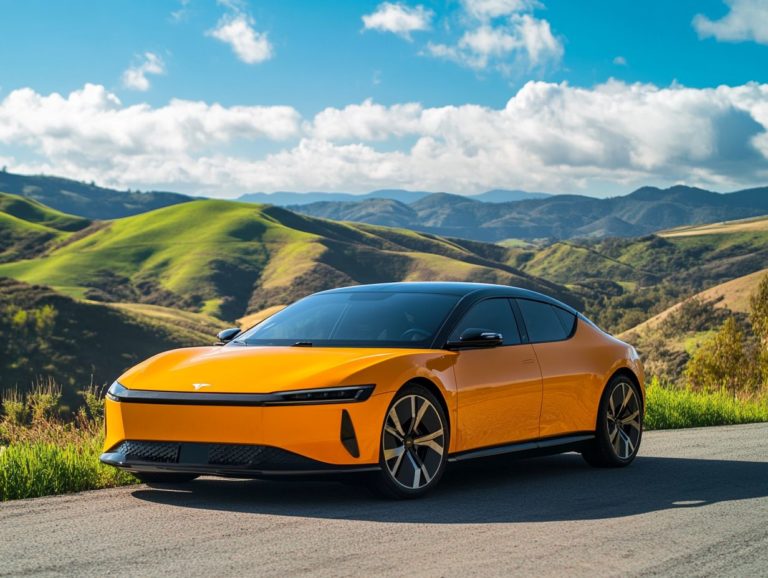Nissan Versus Chevrolet: Electric Car Comparison
Electric cars are transforming the automotive landscape rapidly, presenting eco-friendly alternatives to conventional vehicles.
This comparison delves into two prominent electric car brands: Nissan and Chevrolet. With a focus on pricing, performance, safety ratings, and environmental impact, this guide provides essential information to help you decide.
Whether you are contemplating your first electric vehicle or eyeing an upgrade, this guide illuminates the essential factors that distinguish these brands from one another.
Contents
- Key Takeaways:
- 2. Overview of Nissan and Chevrolet
- 3. Comparison of Price and Range
- 4. Performance and Handling
- 5. Charging Time and Infrastructure
- 6. Design and Features
- 7. Safety Ratings
- 8. Environmental Impact
- 9. Customer Reviews and Satisfaction
- 10. Availability and Accessibility
- 11. Brand Reputation and Reliability
- 12. Warranty and Maintenance
- 13. Future Plans and Innovations
- Which Factors Should Be Considered When Choosing an Electric Car?
- Frequently Asked Questions
- How do Nissan and Chevrolet electric cars compare in terms of range?
- What are the differences in charging options between Nissan and Chevrolet electric cars?
- Which brand has a longer warranty for their electric cars: Nissan or Chevrolet?
- Are there any notable differences in the design of Nissan and Chevrolet electric cars?
- What are the price differences between Nissan and Chevrolet electric cars?
- Do Nissan and Chevrolet offer any incentives for purchasing their electric cars?
Key Takeaways:
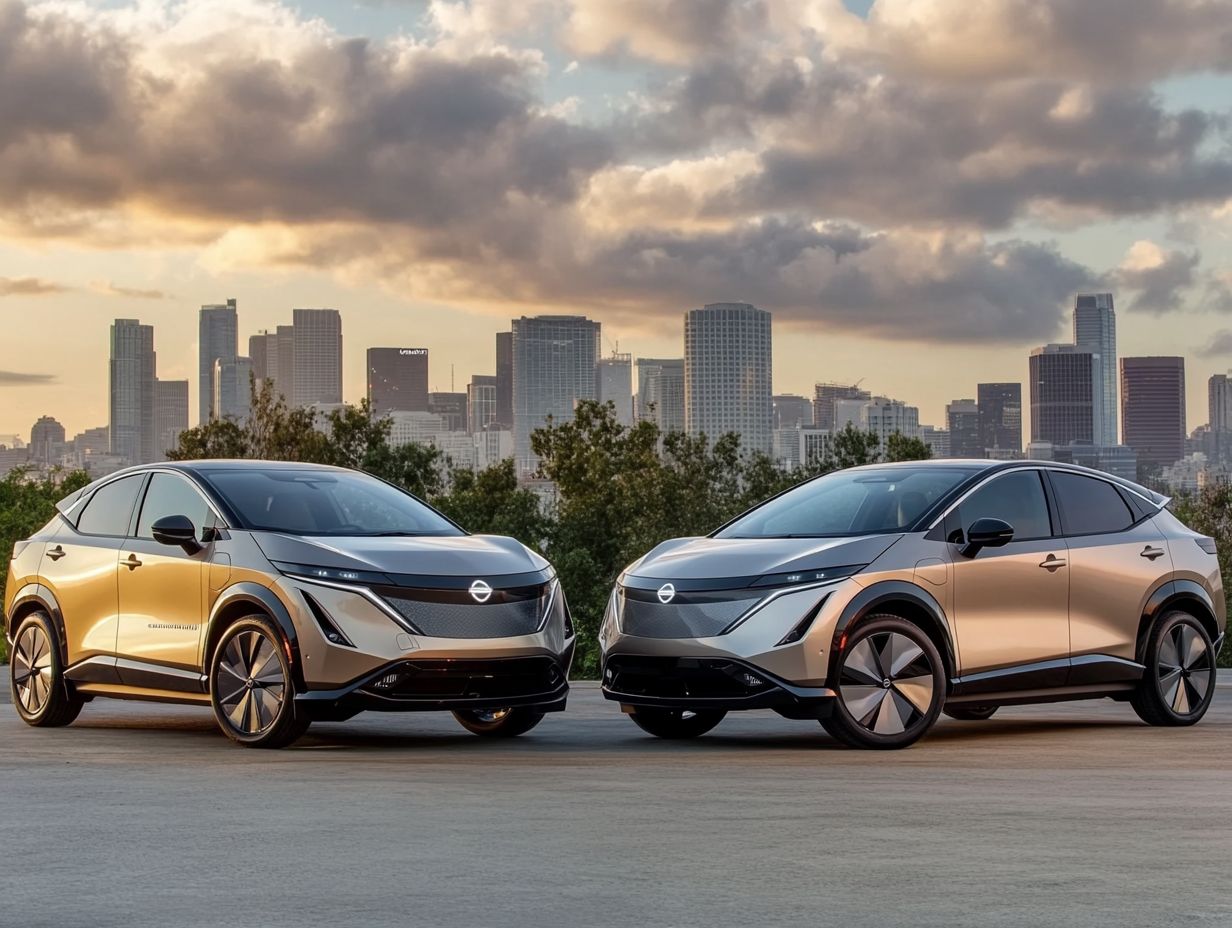
- Nissan and Chevrolet are two leading brands in the electric car market.
- Price, range, performance, and safety should be considered when choosing between Nissan and Chevrolet electric cars.
- Electric cars offer a cleaner and more environmentally friendly alternative to traditional gasoline cars and are predicted to continue to grow in popularity.
2. Overview of Nissan and Chevrolet
Nissan and Chevrolet are leading the charge in the electric vehicle market, each offering different models like the Nissan Leaf and Chevrolet Volt. These models reflect the shifting preferences of consumers who seek efficient and innovative automotive solutions.
These manufacturers have made noteworthy advancements in promoting eco-friendly driving choices. Take the Nissan Leaf, for instance; it’s celebrated for its impressive range and affordability, making it an appealing choice for budget-conscious consumers eager to embrace electric driving.
The Chevrolet Volt offers a unique plug-in hybrid option, allowing you to enjoy the perks of electric driving while maintaining the flexibility of traditional gasoline for longer journeys.
Both vehicles underscore the brands commitment to reducing emissions and enhancing performance. They are pioneers driving the future of eco-friendly technology.
3. Comparison of Price and Range
When you’re in the market for an electric vehicle, it’s essential to weigh the driving range against the price. This makes it crucial to compare models like the Nissan Leaf and Chevrolet Volt to find budget-friendly options that meet your needs for a practical car.
As electric vehicles gain traction, factors such as battery efficiency which refers to how well a battery uses its power terrain, and your driving habits play increasingly vital roles in determining overall range. Unlike traditional gas-powered cars, EVs often require careful planning for long trips due to their limited range.
While family-oriented models like the Tesla Model Y and Ford Mustang Mach-E boast impressive distances on a single charge, their price tags can be intimidating. Gas vehicles may offer more immediate range, but they often come with higher long-term fuel costs.
Balancing these factors initial purchase price, ongoing expenses, and practical driving capabilities is crucial as you strive to make an informed decision.
4. Performance and Handling
The performance and handling of electric cars like the Nissan Leaf and Chevrolet Volt provide an exhilarating driving experience. Electric motors deliver instant torque and responsiveness that redefine expectations for performance cars.
This instantaneous power allows for quick acceleration, merging into traffic with ease, and navigating tight turns with a level of agility that often leaves conventional gas-powered vehicles behind. The low center of gravity in these electric models enhances stability, making your drive enjoyable and remarkably safe.
Inside the cabin, innovative features like advanced infotainment systems and driver-assistance technologies enhance comfort and convenience, turning every journey into a seamless experience. Ultimately, electric vehicles embody a bold leap into the future of automotive design, merging efficiency with striking aesthetics that you will appreciate every time you hit the road.
5. Charging Time and Infrastructure
Charging time and infrastructure are pivotal to the everyday usability of electric vehicles. Innovations like fast charging stations dramatically cut downtime, elevating your overall driving experience.
As a potential owner, it s crucial for you to understand the various charging options available. Home charging stations offer the ultimate convenience, letting you recharge overnight. Meanwhile, public charging stations serve as essential support for those longer journeys.
This expanding network of charging infrastructure boosts your confidence as a consumer and promotes the adoption of electric vehicles. With more charging options at your disposal, you can easily adapt your driving habits, seamlessly integrating electric cars into your daily routine without the nagging worry of running out of power.
In the end, a robust charging framework not only simplifies your transition to electric but also contributes to building a sustainable future.
6. Design and Features
The design and features of electric vehicles like the BMW i3 and Nissan Leaf present a remarkable fusion of aesthetics and functionality. They cater to your desire for modernity and efficiency while seamlessly integrating innovative technology into compact hatchback designs.
These vehicles redefine traditional automotive styling with their sleek lines and futuristic silhouettes, striking a chord with your contemporary sense of taste. The emphasis on eco-friendly materials for interior finishes, paired with state-of-the-art digital gauges, reflects a growing commitment to sustainability and advanced usability.
If you’re looking for vehicles that perform exceptionally and match your values, these designs are a must-see! They underscore a dedication to a greener future, a sentiment that deeply resonates with today s environmentally-conscious consumers.
7. Safety Ratings
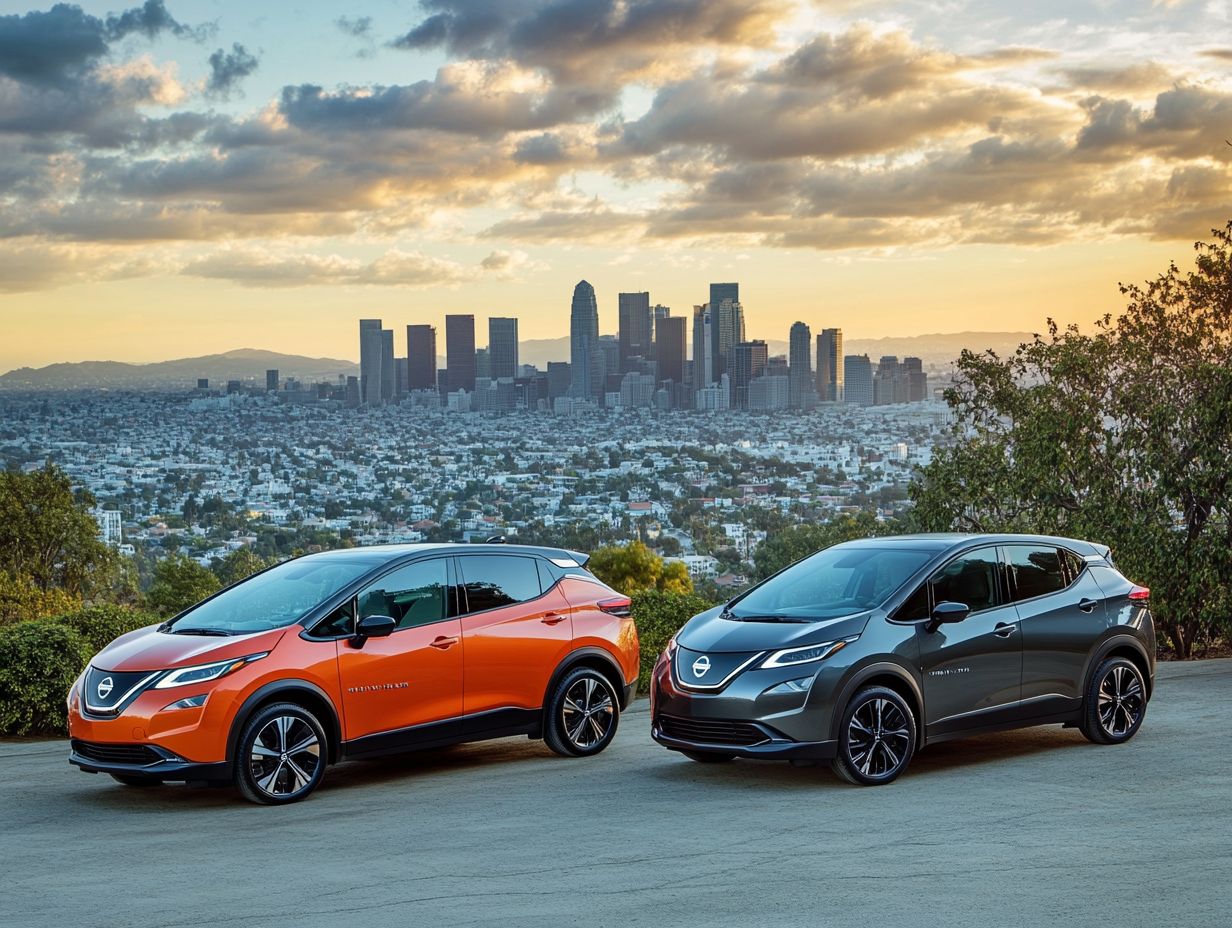
Safety ratings are an essential consideration when it comes to any vehicle, and electric cars are demonstrating competitive results. The advancements in automotive technology have made them just as safe if not safer than traditional gas-powered and hybrid vehicles.
These innovations include superior structural designs, enhanced crash avoidance systems, and cutting-edge sensor technologies that are becoming increasingly standard in electric models. Recent crash tests by regulatory bodies show that electric vehicles often shine in performance, frequently securing top marks for occupant protection. The low center of gravity in many electric cars contributes to improved stability, significantly reducing the risk of rollovers.
Manufacturers are also integrating features like automatic emergency braking and adaptive cruise control, which are key in preventing accidents. Collectively, these advancements indicate that electric vehicles are not merely eco-friendly options; they prioritize safety in ways that align perfectly with modern driving demands.
8. Environmental Impact
The environmental impact of electric vehicles is significantly lower than that of traditional gasoline cars. This highlights their importance as emission-free alternatives that contribute to a sustainable future in the automotive industry.
By harnessing renewable energy sources like wind and solar, these vehicles can operate with nearly zero emissions, enhancing their ecological advantages.
Advancements in battery technology not only enhance energy storage capacity but also facilitate the seamless integration of these cars into greener energy grids.
As the industry advances recycling processes for batteries, it ensures valuable materials are recovered and reused, minimizing waste and promoting a circular economy.
Collectively, these factors underscore the vital role electric vehicles play in reducing your carbon footprint and fostering a cleaner environment for generations to come. Electric vehicles are not just an eco-friendly choice; they are the safe, smart choice for your next ride.
9. Customer Reviews and Satisfaction
Customer reviews and satisfaction ratings for electric vehicles like the Chevrolet Volt and Nissan Leaf reveal a growing appreciation for the innovative technology and enriched driving experience they provide.
Many owners rave about the smooth, quiet ride these electric vehicles offer. They often highlight how the instant torque from electric motors adds excitement to their daily commutes. However, some users express concerns about the availability of charging stations, especially on longer journeys, which can be a challenge for frequent travelers.
On the flip side, features like braking that helps recharge the battery and advanced safety technology receive high praise! These elements instill a sense of confidence and satisfaction in users. When you consider the cost savings on fuel and maintenance, plus the environmental perks, it s no surprise that electric vehicle owners feel their choice has far exceeded expectations.
10. Availability and Accessibility
Electric vehicles are becoming easier to find! Manufacturers like General Motors are rolling out budget-friendly options to cater to a broader audience.
As you explore various regions, you ll notice a remarkable surge in electric vehicle choices, reflecting automakers commitment to meeting the rising demand for sustainable transportation. Companies are enhancing their product lines and integrating innovative technologies to improve driving range and speed up charging.
Government initiatives, such as tax incentives and rebates, are boosting adoption rates. Ongoing efforts to expand the charging infrastructure make it easier for you to make the switch. Dealerships are also broadening their electric vehicle inventories, ensuring you have plenty of access to these eco-friendly options.
11. Brand Reputation and Reliability
Brand reputation and reliability are key considerations when choosing electric vehicles. As a discerning consumer, you likely prefer established names in the automotive industry for quality and long-term satisfaction.
In this evolving market, brands like Nissan and Chevrolet have made significant strides in building your trust. By emphasizing technological advancements and customer-focused features, they aim to stand out against newer entrants. Reliability is particularly important; you re inclined to invest in electric vehicles from manufacturers known for producing durable, high-performing cars.
This trust shapes your purchasing decisions and influences brand loyalty. A positive ownership experience often leads to repeat purchases and enthusiastic recommendations to friends and family!
12. Warranty and Maintenance
Warranty and maintenance play crucial roles in your experience as an electric vehicle owner. You want to be confident that you re making a wise investment in cutting-edge technology and dependable performance.
Understanding the different warranty offerings from manufacturers can sway your buying decision. For example, some companies provide extensive coverage on battery components, which is vital for the longevity of electric vehicles. When comparing these warranties, consider the unique maintenance requirements of both electric and hybrid models.
Typically, these vehicles have fewer moving parts than traditional combustion engine cars, leading to potentially lower maintenance costs for you. However, staying informed about specific upkeep protocols is essential for a positive long-term ownership experience.
13. Future Plans and Innovations
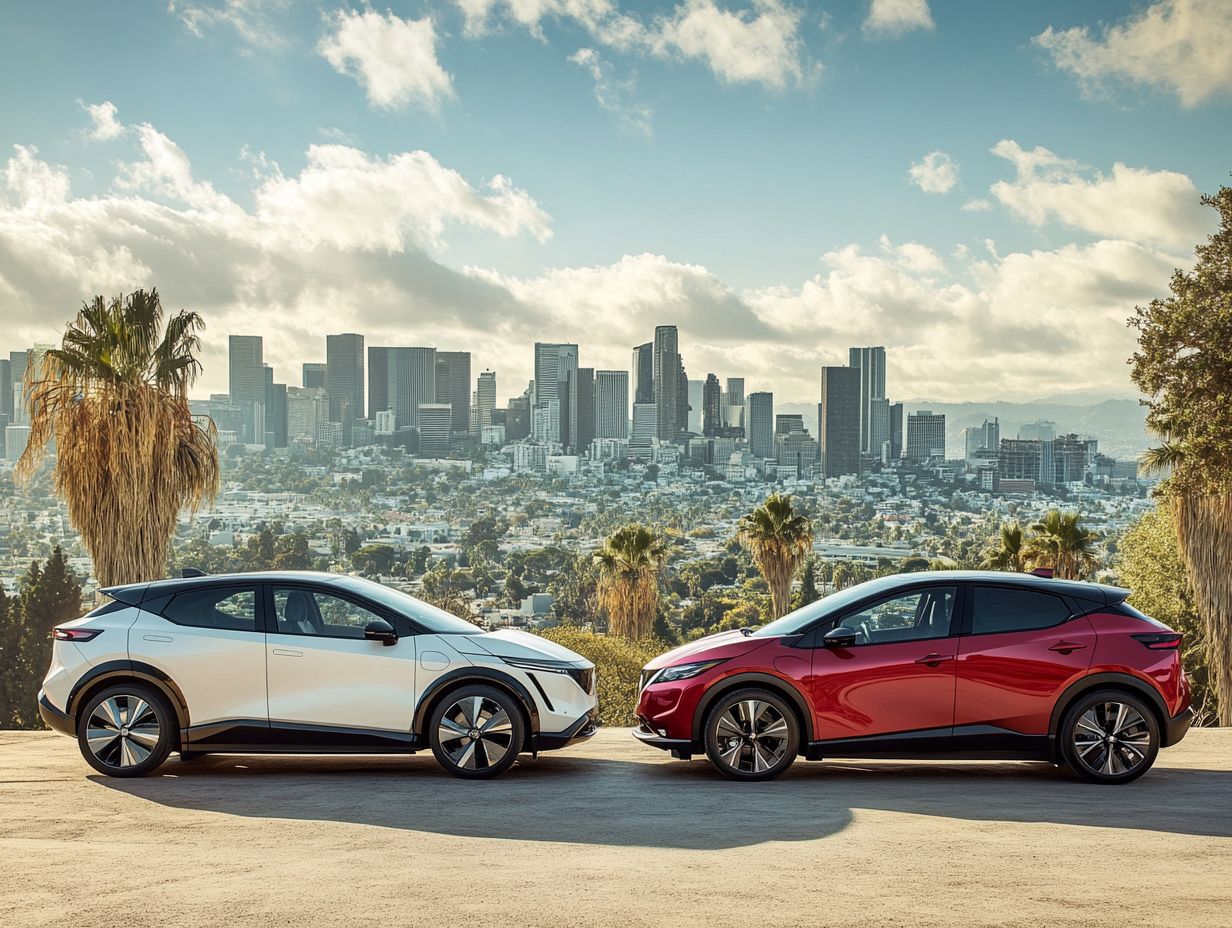
The future plans of automotive manufacturers focus on innovative strides in electric vehicles that match your evolving preferences for performance, efficiency, and sustainability.
These companies are investing heavily in better batteries to extend range and cut down charging times. This directly addresses your concerns about usability and convenience.
With smart technology and connectivity features integrated into electric vehicles, you ll enjoy an enhanced driving experience that appeals to your tech-savvy side while prioritizing safety.
As manufacturers tap into renewable energy sources for charging options, they create comprehensive charging networks. This makes access easier for you and all drivers.
In a landscape filled with regulatory shifts and market demands, these innovations present both challenges and exciting opportunities for the future of electric mobility!
Which Factors Should Be Considered When Choosing an Electric Car?
Choosing an electric car requires careful thought. Key factors include your budget, driving range, charging time, and overall performance.
In today s rapidly evolving market, evaluating these elements is essential for making a well-informed decision! Your budget may range from entry-level models to luxury options, influencing both upfront costs and long-term expenses like maintenance and insurance.
The driving range is crucial! It affects how often you’ll need to recharge your car. Charging time can significantly impact your daily convenience, especially if you have a packed schedule.
Performance metrics think acceleration and handling can elevate your driving experience. This ensures that your chosen vehicle resonates with your personal preferences and habits.
Ultimately, taking the time to assess your individual needs against these varied options allows for a more personalized selection process within the dynamic world of electric vehicles!
What Are the Pros and Cons of Owning an Electric Car?
Owning an electric car presents a distinctive blend of advantages and drawbacks. You can enjoy the positive environmental impact and lower maintenance costs.
However, challenges like charging access and limitations in driving range may arise.
The benefits of electric vehicles go beyond reduced emissions! They can lead to substantial fuel savings over time, as electricity typically costs less than gasoline. Many governments offer incentives for purchasing electric cars, enhancing their financial appeal.
It s crucial to note that charging your electric vehicle may take longer than refueling a traditional gasoline car. This could be a hurdle if you re juggling a busy schedule.
While manufacturers are making progress in battery technology, concerns about range and the availability of charging stations can create anxiety when considering long trips. Therefore, it s essential for you to thoughtfully weigh these factors before making a decision.
Explore your options and consider how an electric vehicle could fit into your lifestyle!
How Do Electric Cars Compare to Traditional Gasoline Cars?
When you compare electric cars to traditional gasoline vehicles, several key differences come into play, including performance, driving experience, operational costs, and environmental impact. These factors significantly shape your choices and preferences.
Performance-wise, electric vehicles offer exhilarating acceleration thanks to instant torque! This gives you a thrilling driving experience. On the other hand, gasoline vehicles provide a more familiar sound and feel that many drivers appreciate.
Electric cars generally boast lower fuel and maintenance expenses, although the initial purchase price can often be steeper when considering cost of ownership.
Driving range is another vital consideration. While electric vehicles have made impressive strides, long trips can still present challenges compared to the well-established refueling infrastructure of gasoline cars. Electric cars produce fewer emissions, which is appealing to eco-conscious consumers. Traditional vehicles, though becoming more efficient, still contribute to pollution.
This comprehensive comparison illuminates the evolving preferences of consumers as they navigate the future of automotive technology.
What Are the Government Incentives for Electric Car Owners?
Government incentives for electric car owners play a crucial role in promoting eco-friendly vehicles! They provide benefits like tax credits and rebates that help offset your initial purchase costs.
These financial incentives can vary significantly between federal and state levels, offering grants, reduced registration fees, and even exemptions from certain taxes. For example, federal tax credits can substantially lighten your tax burden, encouraging you to make the switch from traditional gasoline cars.
On the state level, various programs offer additional rebates or low-interest loans, making electric vehicle ownership even more enticing.
The cumulative effect of these incentives lowers your overall expenditure on buying and maintaining an electric vehicle. This also serves as a compelling motivator for you to embrace sustainable transportation options.
What Are the Predictions for the Future of Electric Cars?
Predictions for the future of electric cars indicate a remarkable surge in the automotive industry! This is fueled by technological advancements, evolving consumer preferences, and an increasing focus on sustainability and innovation.
Recent trends reveal that as battery technology progresses, electric vehicles are becoming more accessible and budget-friendly. The rise of diverse charging infrastructure has eased range anxiety, promoting adoption.
Reports show that younger buyers are increasingly leaning towards environmentally conscious options, signaling a shift in consumer behavior that prioritizes sustainability. These developments suggest a reimagined automotive landscape, where traditional car engines may gradually be replaced by more efficient and eco-friendly alternatives, transforming your perception of transportation.
How Can Electric Cars Benefit the Environment and Society?
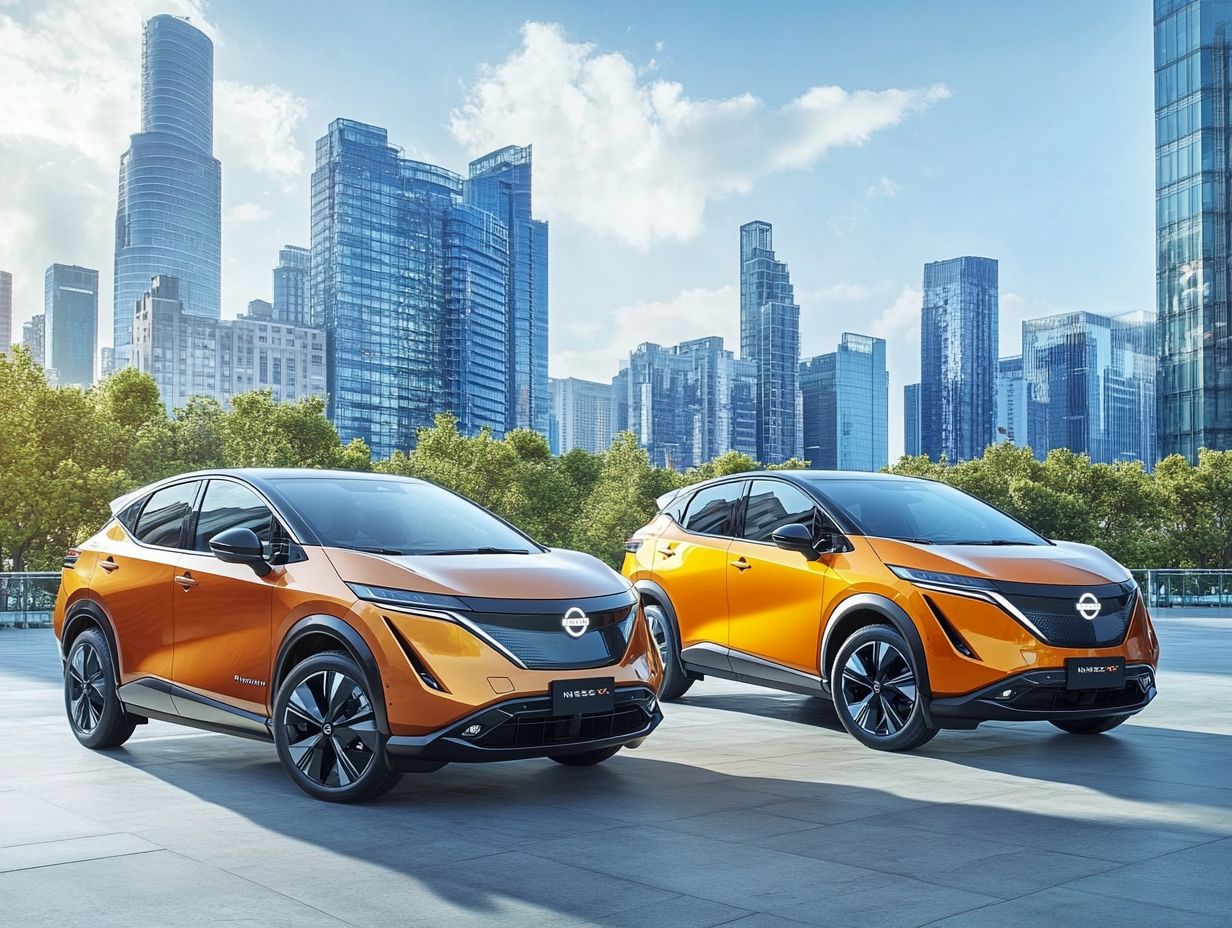
Electric cars present you with a wealth of benefits for both the environment and society! They offer emission-free alternatives that contribute to cleaner air, diminished urban noise, and a sustainable future for generations to come.
By significantly reducing greenhouse gas emissions, they play a pivotal role in the fight against climate change while minimizing the harmful pollutants typically released by gasoline and diesel vehicles. This transition fosters healthier communities, improving public health outcomes by alleviating respiratory issues and other health problems linked to air pollution.
As you and others embrace electric vehicles, the diminished dependence on fossil fuels enhances energy security and encourages a shift towards renewable energy sources. This paves the way for a cleaner and more resilient energy landscape.
Considering making the switch to an electric vehicle? Explore your options today!
Frequently Asked Questions
How do Nissan and Chevrolet electric cars compare in terms of range?
Nissan and Chevrolet electric cars have similar ranges. The Nissan Leaf can travel up to 226 miles, while the Chevrolet Bolt goes as far as 259 miles.
What are the differences in charging options between Nissan and Chevrolet electric cars?
Nissan provides both standard and fast charging options. In contrast, Chevrolet focuses solely on fast charging.
Which brand has a longer warranty for their electric cars: Nissan or Chevrolet?
Both brands offer an 8-year or 100,000-mile warranty for their electric cars. Chevrolet, however, extends this warranty specifically for the battery.
Are there any notable differences in the design of Nissan and Chevrolet electric cars?
Nissan and Chevrolet electric cars have unique designs. The Nissan Leaf features a classic look, while the Chevrolet Bolt boasts a sleek, modern style.
What are the price differences between Nissan and Chevrolet electric cars?
The Nissan Leaf starts at $31,600, while the Chevrolet Bolt begins at $36,620. Prices may vary based on the model and added features.
Do Nissan and Chevrolet offer any incentives for purchasing their electric cars?
Both Nissan and Chevrolet provide federal tax incentives for electric car purchases. Nissan also has state and local incentives, while Chevrolet gives discounts for Costco members.

